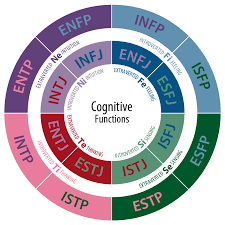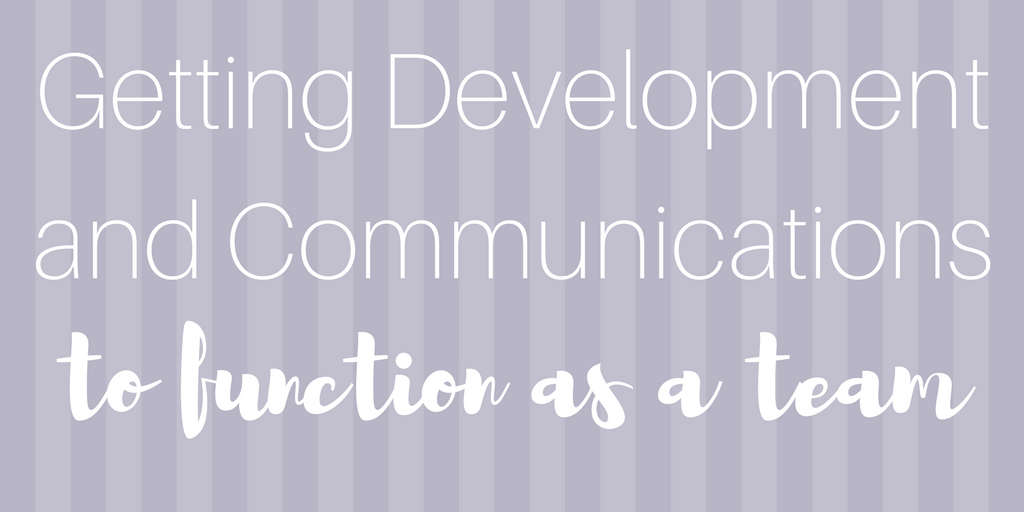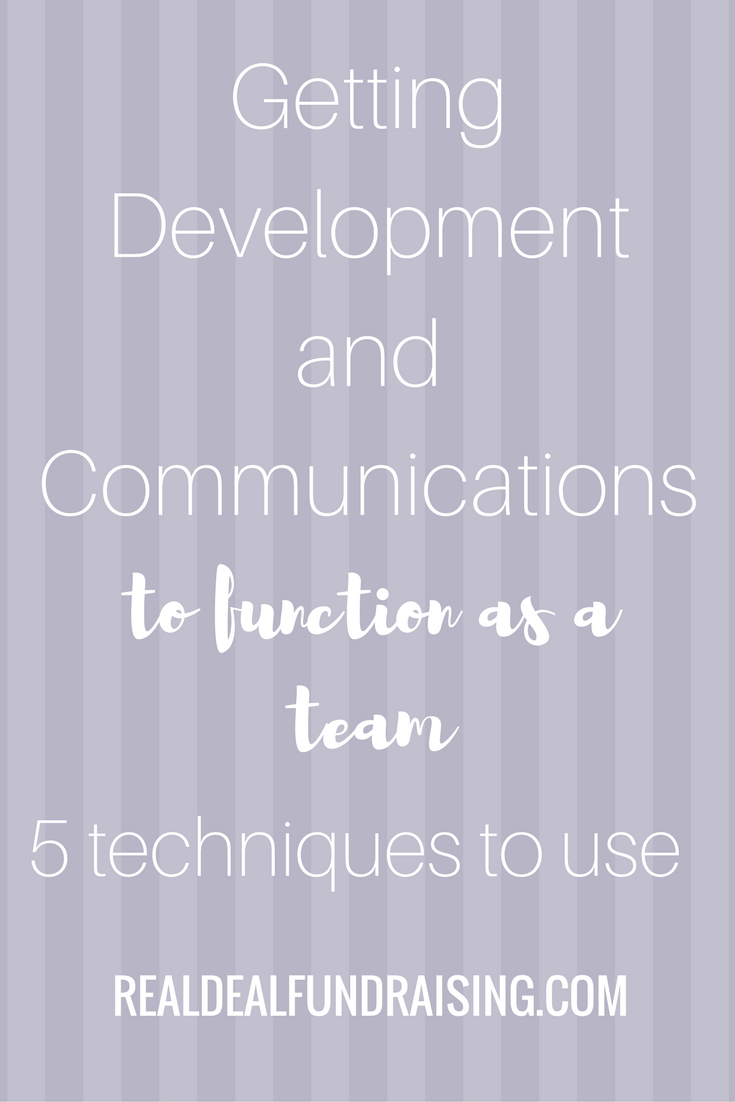|
One of the most important alliances at a nonprofit organization is between the fundraising staff and the marketing/communications staff. Making sure that the message about the funds needed and how those funds connect to mission is a crucial element of success.
Despite the importance of cooperation, it can be frustrating for fundraisers to work with public relations officers who don't have much experience with advancement work. The communication folks may find messaging about fundraising to be crass or pushy. Consequently, they might not want to give development the appropriate amount of space in the marketing channels. Here a few tips I've used to improve the working relationship between development and marketing/communication colleagues: EDUCATION Educate them on what it takes to do your job! Let them know what your goals are and let them know how many messages and how many different channels you need to be participating in order to reach those goals. Show them statistics and analytics. Help make your goals into their goals. HELP THEM HELP YOU Make it as easy for them as possible to assist you. That means drafting a lot of your own messaging whenever possible, selecting your own images and putting all of that together into a comprehensive plan. Whether the plan is for social media or email or even your direct mail, if they assist you in managing any processes, be very clear about dates, times, and details. Having your plan together will help get them on board. SET THE TONE FOR TEAMWORK Like any important colleagues, acknowledge what it is that bring that they bring to the table that is unique. Make them understand that you're on the same team. As fundraisers, we strive to be donor-centric and therefore we are advocates for our constituents. Assure them you don't want to over-message to your constituents either. You're both playing on the same team and the goal of that team is to bring in the resources necessary for the organization to complete its important mission. BE FIRM ABOUT THE CALL TO ACTION Being a team player doesn't mean being a pushover. You understand the best way to motivate your prospects to give. Don't let your calls to action get buried in more general promotional materials. Insist upon clarity in this portion of your communication and you will see success. Similarly, be firm about deadlines. More general marketing materials aren't as time-bound as annual giving. It's called annual for a reason. You only have one year to get it done. FOCUS ON STORYTELLING Play to the strengths of your communications colleagues by asking for their assistance with storytelling. Framing a moving and emotional narrative will only make your fundraising materials stronger. This is a skill that should come very naturally to your communications allies. Tap their creativity in this area and not only will your messages improve but your colleagues will feel like an integral part of the team. I've worked at institutions where the dynamic between these two departments was less-that-optimal and it hampered fundraising productivity. I've also worked at institutions where there was a team atmosphere and mutual understand of goals. Everything is much easier when you focus on relationships first and foster learning and communication surrounding goals. How does the development team work with the communication staff at your institution? Do the two groups function as partners or as a client-service relationship? Comments and questions are, as always, welcomed and encouraged! Cheers, Jessica Cloud PS - If you liked this post, you might also like these:
PPS - If you found this article helpful, please comment and let me know. Also subscribe to Real Deal Fundraising so you don't miss a post! You'll get my guide to Call Center Games for Free!  When I was in high school I went to a leadership conference and the organizers had each attendee take the Myers-Briggs Personality Test. (If you aren't familiar with this personality assessment, check out 16personalities.com. I found their analysis to be spot on and helpful as well.) I’m always the same type: ENTJ, the Field Marshall. It’s a relatively rare type and I had never met anyone else that was also an ENTJ. On the last day of the conference, the organizers did something fiendish. They split the group of about 200 student leaders up into smaller groups by personality type. We were given a project to accomplish with those who were our same type. There were only 2 other ENTJs. I immediately loathed both of these people. We all were supremely confident that we had the answers to lead the group to victory and we were all quite vocal about it. I began to wish that I had never met another ENTJ. Was I this terrible to be around? Our group made no progress on the project because we could not stop arguing. After a certain amount of time, these conference organizers gave us all new groups. We were matched with a diverse group representing many different Myers-Briggs types. What a relief! The other groups had struggled too, in different ways. Certain groups couldn’t finish because they just socialized and never got on task. Still other groups over-deliberated. Some never had a leader step forward at all. Each person in our new group had a natural role. I assumed the executive role and others helped the group cooperate and still others made sure we took all details into account. Compared to my ENTJ group, this was project bliss. What I learned from this experience was that there is truly strength in difference. Hiring others who are just like you is not a winning strategy. Also, work is more fun if everyone is a little bit different. Quirks emerge when folks are not all the same. Not to mention that it leads to more productivity when skill sets complement each other rather than clash. So, next time you take one of those personality quizzes on Facebook, think about the results those around you might get too and how that helps you succeed together. Consider this too in your choice of mentor and in your hiring decisions. If you are a big picture “N” (Intuitive), it might be worthwhile to have a “S” (Sensing) perspective in your office to balance your tendencies. You might be so idea driven, you miss critical details that would affect implementation. As a manager, if you are a “TJ” combination (Thinking-Judging), you’ll tend to make snap decisions based on rationality and you’ll often alienate those who are make slower decisions based on feelings. It’s a good idea to consult someone who approached problems differently, especially if your decision will affect many other people. Learning more about yourself is fun and, like a horoscope, it’s entertaining to see how your profile "matches" you. But, I would challenge you to use these types to learn more about those around you for better understanding and perspective. |
Jessica Cloud, CFREI've been called the Tasmanian Devil of fundraising and I'm here to talk shop with you. Archives
June 2024
Categories
All
|



 RSS Feed
RSS Feed
